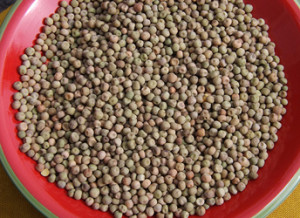 Dried field peas are available all year long. They belong to the same family as beans and lentils and, like them, are a small but nutritionally mighty member of the legume family, and a very good source of cholesterol-lowering soluble fiber.
Dried field peas are available all year long. They belong to the same family as beans and lentils and, like them, are a small but nutritionally mighty member of the legume family, and a very good source of cholesterol-lowering soluble fiber.
Soluble fiber helps to prevent constipation and digestive disorders like irritable bowel syndrome and diverticulosis. It also helps lower cholesterol and is of special benefit in managing blood-sugar disorders, since the high fiber content stabilizes blood sugar levels and prevents them from rising rapidly after a meal. If you have insulin resistance, hypoglycemia or diabetes, legumes like dried peas can really help you balance blood sugar levels while providing steady, slow-burning energy.
Dried field peas also provide good to excellent amounts of five important minerals, three B-vitamins, and protein—all with virtually no fat. As if this weren’t enough, dried peas also feature isoflavones, phytonutrients that act like weak estrogens in the body and whose dietary consumption has been linked to a reduced risk of certain health conditions, including breast and prostate cancer.
In addition to their stellar fiber content, dried peas also feature other heart-healthy nutrients. They are a good source of potassium, which may decrease the growth and development of blood vessel plaques and is also good for lowering high blood pressure.
